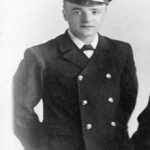

‘Next of Kin’ – memories and mementos of WWI coming to Kirkwall

An exhibition created by National Museums Scotland opens at the Orkney Museum, in Kirkwall, next Saturday.
Next of Kin presents a picture of Scotland during the First World War using treasured objects from official and private sources, passed to close relatives and down through generations.
The exhibition was previously shown at the National War Museum in Edinburgh Castle, and the Orkney Museum is the last of eight touring venues around Scotland.
The Kirkwall exhibition in Kirkwall includes two Orkney stories.


The first tells of a long-lost gold ring, given as an engagement present to Stanley Cubiss, who served aboard the destroyer HMS Opal and saw action at the Battle of Jutland.
Stanley lost his life when the Opal and another destroyer, HMS Narborough, steamed into cliffs in South Ronaldsay during a night-time blizzard.
His ring – inscribed “To Stanley from Flo – 6 March 1916” – was found by a diver in 2007 and later donated to the Scapa Flow Visitor Centre and Museum by Stanley’s nephew.
The second story involves the Clouston family, who lived at a farm close to the Caldale air station, near Kirkwall. Here the family welcomed men serving at Caldale into their home, treating them to farm produce like cheese, homebaked bannocks, cakes and jam.
Two autograph albums filled with messages and drawings from the grateful servicemen were kept by the family as treasured possessions, as was an embroidered tablecloth with the men’s signatures picked out in white thread.
Councillor Harvey Johnston, chairman of the OIC’s education, leisure and housing committee, said: “These very personal stories help bring to life the experiences of people serving in Orkney a century ago and the considerable impact the war would have had on our local community.”